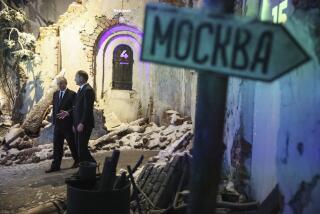Yugoslavia and Romania Take Steps on Fallout
- Share via
WARSAW — Romania and Yugoslavia announced precautions Friday to protect their populations against radioactive contamination as shifting winds carried fallout from the damaged Soviet reactor at Chernobyl southwest across the Balkans.
State television in Romania reported for the first time since the accident a week ago that radiation levels were registering “much over normal” in several areas of the country. The brief announcement gave no figures for the measurements but said they were high enough to warrant distributing protective doses of iodine to children up to the age of 18 in affected areas.
Romania thus joined Poland as the second Warsaw Pact ally and neighbor of the Soviet Union to begin dispensing iodine on a large scale. There have been no indications, however, that the Soviet Union has done so for its own population.
‘Saturation’ of Gland
The purpose of the iodine is to “saturate” the thyroid gland, where it tends to accumulate, and prevent the intake of radioactive iodine-131, the major component of the fallout. This radioactive form disappears relatively quickly from the environment, decaying by half every eight days.
Meanwhile, White House spokesman Larry Speakes disclosed in Tokyo today that, at the request of several Eastern European countries, President Reagan has dispatched teams of experts to provide technical and medical assistance in the aftermath of the Chernobyl explosion. Speakes, at a briefing on the economic summit that gets under way here Sunday, did not name the countries.
The Romanian measures followed the formation Thursday of a special government commission to monitor the contamination. In keeping with the style of Communist Romania’s ruling family, President Nicolae Ceausescu named his wife, Elena, a first deputy premier, to head the commission.
Romania’s decision to distribute iodine came as the World Health Organization in Geneva said no such precautions appeared necessary for pregnant women and children outside the Soviet Union, where contamination is presumed to be the heaviest. The Soviets, however, have disclosed no details of the human effects of the accident except to say--implausibly, in the view of many Western experts--that only two people were killed and 197 injured, 18 of them seriously.
Clouds Turn Southward
In Belgrade, Yugoslav authorities said radioactivity rose overnight from only two times above the normal background level on Thursday to eight times normal on Friday as shifting winds turned drifting clouds of fission wastes southward.
A program on Yugoslavia’s state-controlled radio said “there is no need for excessive alarm” but urged people not to spend long periods outdoors, to avoid drinking rainwater and to wash fresh fruits and vegetables carefully. Scandinavian, West German and Polish authorities have issued similar advice, although all have stressed that the level of radioactivity is well below that likely to cause any measureable harm.
The Austrian government also has announced measures to reduce exposure to radioactivity, including advice to parents to keep children from playing in rain water or in gardens or sandboxes where radioactive dust has gathered.
‘Free of Radioactivity’
The Austrian Health Ministry announced Friday, however, that “the air is completely free of radioactivity.” On Wednesday, radiation levels at 20 times normal had been reported in areas around Salzburg.
According to reports from Romania, officials have reported above-normal radiation readings in Bucharest, in the northern Transylvanian counties of Cluj and Mures and in Isai and Suceava counties in the far northeast, where the nearest border is about 250 miles from the burned-out reactor in the Soviet Ukraine. State television advised people to stay indoors, wash fruits and vegetables and avoid rural water.
The appearance of fallout over much of the Balkan Peninsula indicates that large areas of the southern Ukraine and Moldavia, the Soviet Union’s most productive farmland, were also contaminated to some degree, although Western experts have said they expect most of the radioactivity beyond the vicinity of Chernobyl to dissipate over the next several weeks.
In Poland, a government commission said Friday that radiation levels continue to decline, but it released no new information on the actual level of contamination. And newspapers reported nothing from a 90-minute news conference that members of the special government monitoring commission held on Thursday with Western reporters.
500 Times Normal
After repeated questions, one commission member disclosed during the news conference that radioactivity had reached as high as 500 times the normal background level near the lake country town of Mikolajki, 120 miles north of Warsaw. In addition, Western diplomats said other figures disclosed by the commission implied that the contamination averaged 150 times the normal background earlier in the week, substantially more than in West European countries.
Partly because the authorities have failed to provide a detailed picture of conditions in Poland, three Western embassies on Friday began a voluntary evacuation of dependents and children.
Diplomats at the British, Canadian and Australian embassies said a total of 55 dependents--mostly children accompanied by their mothers--took advantage of the opportunity and left Friday by plane and car for Western Europe. They followed about 40 French, German and Italian dependents who left earlier in the week for an undetermined period of time.
‘Don’t Play Around’
“There is no certainty (about the radiation risk), and in the absence of certainty you don’t play around with kids’ lives,” said Robert Poetschke, a first secretary of the Canadian Embassy.
The British Foreign Office in London has advised travelers to avoid Warsaw for the time being until conditions here are clarified, and the British Embassy has recommended that its citizens living in Poland make arrangements for their children to leave.
However, the American Embassy has not recommended that dependents leave the country. “We’re being told that the danger from atmospheric radiation has peaked and it’s not a health hazard,” said Paul Smith, an embassy press officer.
Advisory on Milk, Water
Smith noted that the State Department has not issued an “advisory,” or warning, about travel to Poland. But he said the embassy recommends not drinking Polish milk or tap water and washing fruits and vegetables carefully.
The American Embassy restaurant, however, was still serving coffee and tea made with local tap water, apparently because waiters mistakenly thought that simply boiling the water would get rid of the radiation.
In a reflection of the uncertainty that reigns among embassies, the British Embassy clinic, which serves the Warsaw foreign community, advised on Wednesday against taking iodine on the ground that contamination had peaked the day before. But on Friday, after consulting with doctors in London, the clinic backtracked, issuing a new bulletin urging parents to obtain iodine for their children at public hospitals.
Other European developments, as reported by wire services:
--Remnants of the cloud from the reactor explosion and fire reached Britain, but authorities in London said there is no health risk to the public.
The National Radiological Protection Board said that particles from the radioactive fallout have been detected over southeast England but that the concentrations “are very low. . . . It is clear that people in the U.K. will not be placed at risk from the cloud.”
--The World Health Organization accused the Soviet Union of failing to inform neighboring countries about possible health hazards from the Chernobyl accident.
Noting that “no concrete information has been provided by the source country for guidance of other countries,” the organization issued a report containing guidelines on nuclear accidents to the 33 Eastern and Western member countries of the U.N. agency’s European region.
--The clothes of some Western students who returned from the Soviet disaster area contained unacceptable levels of radiation, indicating that the cities of Kiev and Minsk “have a contamination problem,” a British expert said.
But Dr. Barry Holiday, head of operations of the National Radiological Protection Board, said all 111 students who arrived at London’s Heathrow airport Thursday night were in good health. “They are in no danger whatsoever,” Holiday said.
--Higher radiation levels were reported in the Netherlands and Luxembourg for the first time since the Chernobyl accident.
More to Read
Sign up for Essential California
The most important California stories and recommendations in your inbox every morning.
You may occasionally receive promotional content from the Los Angeles Times.













